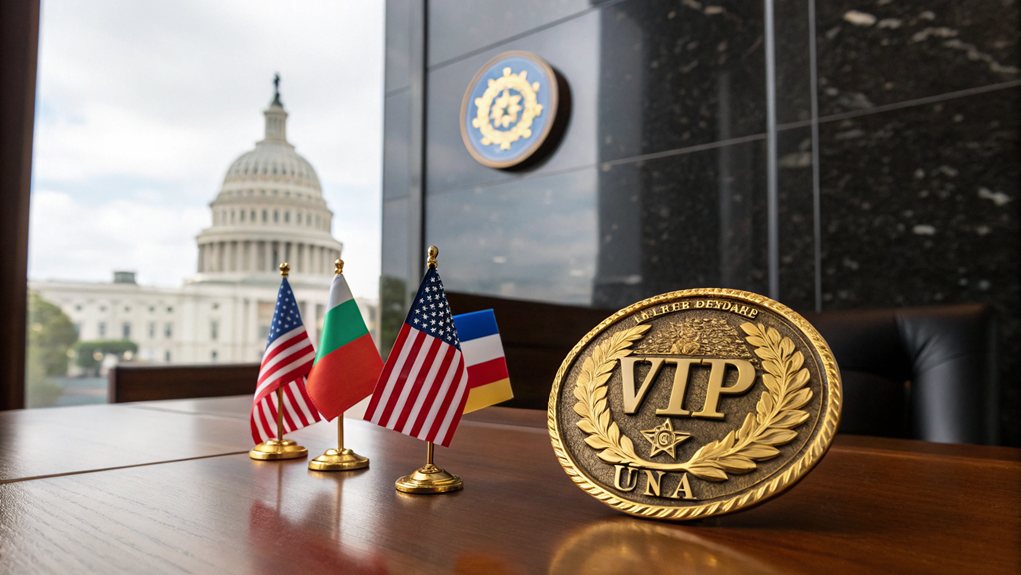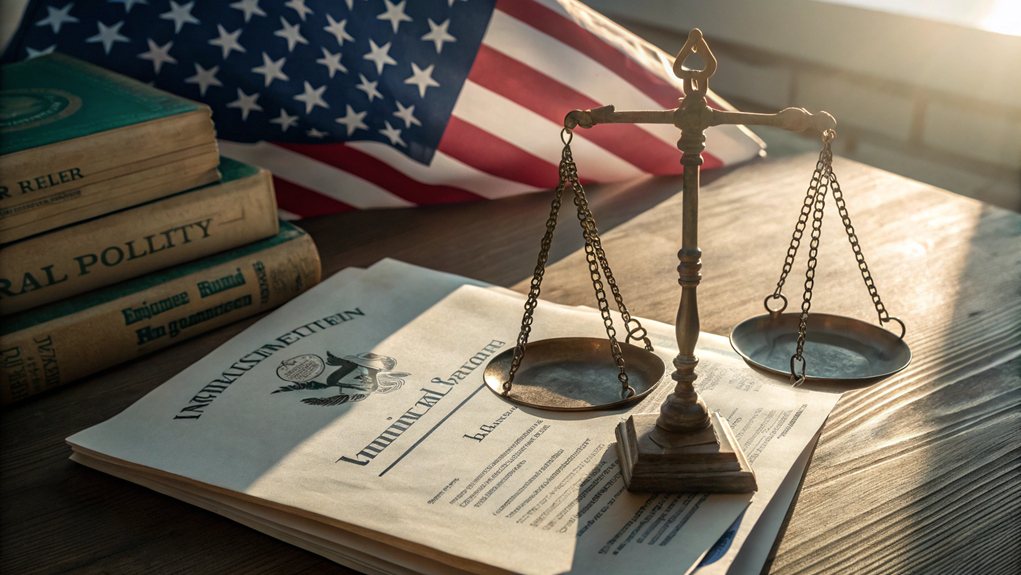Diplomatic immunity in the United States? It's like a VIP pass for diplomats. They can't be arrested or prosecuted for minor offenses. But, don't get too excited—this immunity isn't a free-for-all. Serious crimes? They might get booted out, or their country might waive their immunity. The rules vary depending on their role, too. Some staff get less protection. So, while it sounds like a get-out-of-jail-free card, there are strings attached. Want more details? Stick around!

Diplomatic immunity in the United States is like a VIP pass for foreign diplomats—complete with perks and pitfalls. Sure, they get to strut around without the fear of being arrested for minor infractions. But let's face it, that can lead to some pretty outrageous behavior.
Diplomatic immunity is a VIP pass for diplomats, allowing freedom but sometimes sparking outrageous antics.
The whole setup is based on the Vienna Convention on Diplomatic Relations, a fancy name for a treaty that the U.S. ratified ages ago. The Diplomatic Relations Act of 1978 lines out the specifics, ensuring that diplomats can enjoy their immunity while the rest of us obey the law like good little citizens.
Not all diplomats are created equal, though. Diplomatic agents get the royal treatment, enjoying full immunity from arrest and prosecution. Meanwhile, the administrative and technical staff? They can get a slap on the wrist for traffic violations.
Service staff? Well, they might find themselves in hot water—limited immunity means they can be arrested. And consular officers? They're in a gray area, facing arrest for felonies if the proper paperwork is in place. Fun times!
But hold up. Immunity isn't a free-for-all. Real actions tied to personal property don't get the immunity stamp. If a diplomat decides to dabble in commercial activities, they can't hide behind their fancy title. Diplomatic immunity offers almost total protection from criminal, administrative, and civil laws, making it crucial for maintaining diplomatic relations. Additionally, this immunity varies by category of official, meaning some officials have more protection than others.
There's also the possibility of a waiver, where the diplomat's home country can throw them under the bus if they commit a serious crime. And yes, they can be kicked out if they're declared *persona non grata*.
Frequently Asked Questions
Can Diplomats Be Prosecuted for Serious Crimes in the U.S.?
Diplomats can technically be prosecuted for serious crimes in the U.S., but it's not straightforward.
If their home country decides to waive immunity, then sure, bring on the charges. But good luck getting that waiver!
Most times, it's a diplomatic dance, and the diplomat just gets booted out instead.
Sure, they might break the law, but hey, they've got immunity. It's like a free pass—when it's not a total headache for everyone involved.
What Happens if a Diplomat Violates U.S. Laws?
When a diplomat breaks U.S. laws, things get tricky. They can't just waltz into court; that would be too easy.
Instead, the U.S. tries to get the diplomat's home country to waive their immunity. If that doesn't happen, they might just get kicked out, declared *persona non grata*.
Are Family Members of Diplomats Also Granted Immunity?
Yes, family members of diplomats get immunity too.
Spouses and unmarried kids under 21 (or 23 if they're in school) are in the club. They enjoy immunity from criminal charges, just like the diplomats themselves.
But don't get too excited—civil cases are a different story unless they're on official duty.
And if they stop living with the diplomat or get hitched? Boom, immunity gone. Just the way it is.
How Is Diplomatic Immunity Enforced in the United States?
Enforcement of diplomatic immunity in the U.S. is a bit like walking a tightrope.
Law enforcement must play nice, following the State Department's guidelines. They're trained to identify diplomats quickly—because, you know, they can't just throw anyone in jail.
Serious crimes? Well, the U.S. can ask for a waiver, but good luck with that.
Expulsion is the go-to move for problematic diplomats. It's all about keeping the peace, even when it's awkward.
Can Diplomats Refuse to Leave the U.S. After Losing Immunity?
Diplomats can't just plant their feet and refuse to leave the U.S. after losing immunity.
That would be a no-go. Once immunity is revoked, they're expected to pack their bags and skedaddle.
Sure, they can try to stick around, but it's not exactly a wise move. The U.S. can and will expel them if necessary.






